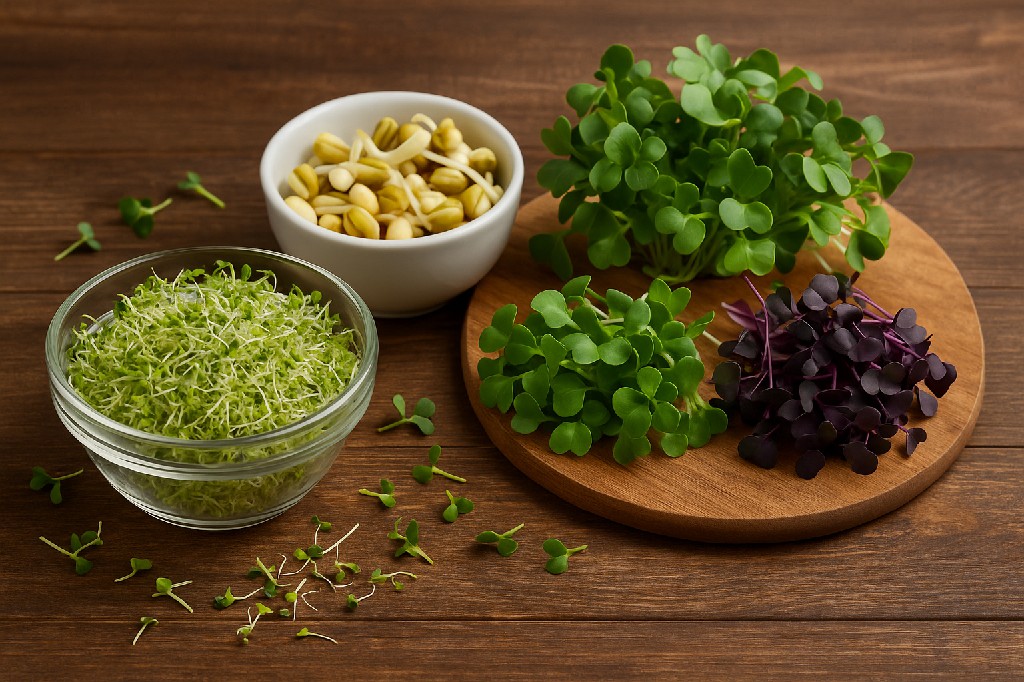Top Health Benefits of Sprouts and Microgreens
Top Health Benefits of Sprouts and Microgreens
Sprouts and microgreens are becoming more popular in healthy diets, and for good reason. The health benefits of sprouts and microgreens go far beyond their small size. These tiny plants are nutritional powerhouses, packed with vitamins, minerals, antioxidants, and enzymes. Because they are harvested in their early growth stages, they often provide more concentrated nutrients than their mature counterparts. Moreover, adding sprouts and microgreens to your meals is an easy way to enhance both flavor and wellness.

What Are Sprouts and Microgreens?
Before diving into the health benefits of sprouts, it’s important to understand what they are. Sprouts are germinated seeds, usually harvested within 2–7 days of germination. Common varieties include alfalfa, mung bean, broccoli, and radish sprouts.
Microgreens, on the other hand, are harvested a bit later, after the cotyledon leaves develop, typically within 7–21 days. They include young greens like sunflower shoots, pea shoots, and baby kale.
Although they are often confused, sprouts and microgreens differ in appearance, cultivation method, and nutrient content. Nevertheless, both are rich in essential nutrients and offer numerous health perks.
Nutrient Density: Core Health Benefits of Sprouts
One of the key health benefits of sprouts is their incredibly high nutrient density. For example, broccoli sprouts contain up to 100 times more sulforaphane, a powerful antioxidant, than mature broccoli. Sulforaphane has been linked to cancer prevention and detoxification support.
Additionally, sprouts are high in:
- Vitamin C, which boosts immunity and skin health
- Vitamin K, essential for bone strength and blood clotting
- Folate, which is vital during pregnancy and for DNA repair
- Fiber, which supports digestion and gut health
Furthermore, because these nutrients are in a bioavailable form, your body can absorb them more efficiently.
Digestive Health and Enzyme Support
Another significant reason to include sprouts in your diet is their positive effect on digestion. One of the health benefits of sprouts is that they are rich in natural enzymes. These enzymes help break down food more efficiently, easing the digestive process.
Moreover, the germination process reduces levels of phytic acid and other antinutrients in seeds. This makes minerals like calcium, iron, and zinc easier to absorb. As a result, people with sensitive stomachs often find sprouts easier to digest than unsoaked seeds or beans.
Boosting Immunity: Health Benefits of Sprouts
In addition to supporting digestion, the health benefits of sprouts include a strengthened immune system. Their high levels of antioxidants, including flavonoids and polyphenols, help neutralize free radicals and reduce inflammation in the body.
For instance, radish sprouts contain compounds that act as natural antimicrobials. These can help the body fight off harmful bacteria and viruses. Combined with vitamins A and C, these antioxidants contribute to a more resilient immune system.
Microgreens and Heart Health
While sprouts are great, microgreens offer distinct cardiovascular advantages. According to several studies, microgreens like red cabbage and cilantro contain polyphenols that help lower LDL (bad) cholesterol and reduce the risk of heart disease.
Even better, they are rich in potassium and magnesium, two minerals that help regulate blood pressure. Thus, another of the health benefits of sprouts and microgreens is improved heart function and circulation.
Managing Blood Sugar and Weight
If you’re looking to manage blood sugar or lose weight, sprouts can be a helpful addition to your meals. Their low glycemic index and high fiber content mean they help regulate blood sugar spikes after eating.
Moreover, sprouts and microgreens are low in calories but high in volume, which helps promote satiety. Eating more of these greens can lead to reduced cravings and better portion control. Therefore, one of the less obvious health benefits of sprouts is improved metabolic health.
Easy to Grow and Incorporate Into Meals
While many superfoods require special storage or cooking methods, sprouts and microgreens are easy to grow at home. All you need is a jar or shallow tray, seeds, water, and a bit of sunlight.
Besides, incorporating them into your meals is simple. Add them to salads, sandwiches, smoothies, and wraps for a crunchy, fresh burst of flavor. This versatility not only boosts nutrition but also makes healthy eating more enjoyable.
Cancer-Fighting Properties: Surprising Health Benefits of Sprouts
One of the most exciting health benefits of sprouts lies in their potential to fight cancer. Research on cruciferous sprouts like broccoli and kale has shown promising results due to their high sulforaphane content.
Sulforaphane stimulates detoxification enzymes in the liver and helps eliminate carcinogens before they can damage DNA. Additionally, some studies suggest it may inhibit tumor growth and promote the death of cancer cells. Although more research is needed, the preliminary data is encouraging.
Mental Clarity and Brain Support
Brain health is another area where the health benefits of sprouts shine. Nutrients like folate, vitamin K, and antioxidants found in microgreens contribute to cognitive function and reduced brain fog.
Furthermore, certain sprouts, like fenugreek and alfalfa, contain compounds that help regulate mood and stress levels. Regular consumption may support neurotransmitter balance, promoting emotional well-being over time.
Environmental and Ethical Advantages
Choosing to grow or buy sprouts and microgreens also has ethical and environmental benefits. They require far less water, space, and time to grow than full-grown vegetables. This makes them a sustainable option for urban gardening and eco-conscious consumers.
Additionally, because you can grow them at home, you reduce the need for plastic packaging and long-distance food transportation. These secondary health benefits of sprouts include contributing to a cleaner environment, which in turn supports public health.
Final Thoughts: Why You Should Eat More Sprouts
To summarize, the health benefits of sprouts and microgreens are both diverse and powerful. From boosting immunity to supporting digestion, heart health, and even mental clarity, these tiny greens deserve a regular spot on your plate.
Moreover, their ease of cultivation and culinary flexibility make them a smart choice for anyone looking to improve their nutrition naturally. Whether you’re an experienced health enthusiast or just starting out, incorporating sprouts into your routine is a simple yet impactful step.
